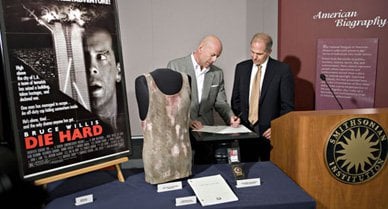Part 2 – Perceptions
In last week’s post, we covered some common definitions of what constitutes a Christmas movie, which included a fairly subjective factor among the criteria: the meaningful use of Christmas in storytelling. Determining whether something is “meaningful” lies more on a continuum than a binary function, so that depends very much on the perception of the viewer. Even the word “use” could imply any number of storytelling methods, from thematic devices, to locations, to dialogue, to music. And I am consistently impressed by the use of music in “Die Hard” whenever I watch it; less so in some of its contemporaries.
One of These Things is Not Like the Others
Before going any further, I will note that Michael Kamen was involved with the music for “Die Hard,” [1] “Die Hard 2,” [2] and “Lethal Weapon” [3] – all movies that regularly crop up in the Christmas movie argument. With strong overlaps in the cast and crew between the three, we should theoretically be dealing with something of a level playing field, but having watched all three in preparation for this post (“Lethal Weapon” for the first time, “Die Hard 2” for the second time), I can say that there is a distinct difference between how music is treated in each of them – and music is one of the most powerful ways to influence mood and context in a movie.

Image credit: [4]
While “Die Hard” maintains a consistently reinforced holiday atmosphere through many visual and dialogue cues, it also succeeds at this task through its score, providing an exceptional level of Christmas continuity to viewers. “Lethal Weapon,” which was released the year before, is only punctuated randomly with Christmas songs, some of which feel so out of place that they are almost jarring, as though we forget and need to be periodically reminded that the movie is set at Christmas. While some argue that Mel Gibson’s Martin Riggs goes through a transformation in the movie, and Danny Glover’s Roger Murtaugh exemplifies family values, and both of those factors signify a meaningful tie to the holiday, I don’t get the sense that the story would feel fundamentally different if it happened in July.
If the difference in Christmas spirit between the two movies was simply an issue of Michael Kamen and crew hitting their stride in 1988, we should have seen at least an equal level of skill in “Die Hard 2,” but that movie largely seems to forget that it’s Christmas after the opening scenes in the airport, which are full of Christmas decorations and Christmas carols. It rapidly becomes a pure action movie in the snow with a last-minute return to triumphant, festive music to bring in the circling planes and to celebrate the Christmas miracle of a torn-up parking ticket. Once again, Christmas feels shoehorned into this movie, especially compared to its seamless inclusion in the original.
Intention vs. Impact
But after doing all of this reading and watching, I had to ask: does the intention to make a Christmas movie necessarily result in a Christmas movie getting made? Certainly, the answer depends on how you define “Christmas movie,” but as with most things in life, there is usually a gap between intention and impact. We know from screenwriter Steven de Souza that producer Joel Silver “had decided he liked all his movies to take place at Christmas, as they would then very likely be played on television every December.”[5] But “Die Hard 2” screenwriter Doug Richardson reminds us that the first film “wasn’t written as a Christmas movie” but rather “written in mind that it’s Christmas time.”[6]

Image credit: [7]
Both “Die Hard” and its sequel are based on novels set at Christmas,[8],[9] and that certainly helped prime them for placement into the holiday season viewing rotation, but the question remains as to whether they were ever intended to be (and whether they have become) Christmas movies. My hypothesis going into this exercise was that 1) “Die Hard” was not intended to be a Christmas movie but ultimately became one, while 2) “Die Hard 2” was intended to be a Christmas movie but ultimately failed to clear the bar. So what’s the verdict?
We know that Joel Silver planned to capitalize on the Christmas settings of these action movies, but did not go any further than that to make something that falls under the definition of “Christmas movie” in a more meaningful way. However, “Die Hard” absolutely meets the additional criteria of incorporating Christmas themes, such as love, sacrifice, and redemption (see: Reel to Reel Movies [10]), and has certainly been enhanced in meaningful ways by virtue of its Christmas setting (see: The Hollywood Reporter [11]). I believe that part one of my hypothesis holds up.
“Die Hard 2” was greenlit fairly soon after “Die Hard,” probably long before it was accepted by the masses as the Christmas masterpiece that it is. Without a doubt, Silver and crew were keen to capitalize on the success of the original by repeating the recipe, but when watching the sequel, it is reasonable to assume that they believed that recipe consisted solely of “action” and “Christmas.” Unfortunately, aspects of the original movie only remain there at a superficial level, absent the growth, sacrifice, and redemption arcs that helped cement “Die Hard” in our culturally accepted canon of Christmas classics, and for that reason, I don’t think it was intended to be a Christmas movie (which is good, because after this exercise I still don’t think it is).

Artist’s site: [12]
The Role of Tradition
But as I mentioned above, some of these measures are subjective, so your mileage may vary when it comes to categorizing such movies. And there’s also the last of The Hollywood Reporter‘s “Christmas movie” criteria to consider: what you traditionally watch that makes you feel Christmas-y. I personally don’t get warm and fuzzy feelings watching Mel Gibson running around, manic and unhinged, but I know plenty of people who keep “Lethal Weapon” in their regular Christmas viewing rotation – and if that’s your tradition and gets you in the holiday spirit, I’m not in the position to tell you to stop.
So, as much as I was not expecting to conclude with anything less than definitive and divisive in this post, I have to concede that Christmas and the traditions around it are different to different people, which may also mean that the definitions of “Christmas movie” shift along with them. And that fact also makes the answer to the initial question of “what is a Christmas movie?” far more subjective than I had hoped or expected. With that thought in mind – that the definition itself may be highly dependent on each individual’s traditions and perceptions – it’s reasonable to assume that everyone will have a slightly different version of that definition. And what that ultimately means is that I’m right (of course)… but it also doesn’t mean that you’re wrong if you disagree with me (which was not what I was hoping for at the end of this exercise.)
Since I am now wrestling with the idea of a subjective and flexible Christmas movie definition that depends in part on family tradition, it seems I can only leave you with the eminently quotable words of Mr. Ebenezer Scrooge: “keep Christmas in your own way, and let me keep it in mine.”[13]
~
How do you keep your Christmas / holiday season? What movies do you watch, and do you consider them to be “Christmas movies”? I’d love to hear about it below.
Thanks for reading!
[1] https://www.imdb.com/title/tt0095016/
[2] https://www.imdb.com/title/tt0099423/
[3] https://www.imdb.com/title/tt0093409/
[4] https://me.me/i/what-else-did-you-rent-die-hard-2-igi-friends-8886583
[7] https://www.smithsonianmag.com/arts-culture/die-hard-donation-157895572/
[8] https://www.goodreads.com/book/show/16245510-nothing-lasts-forever
[9] https://www.goodreads.com/book/show/17377037-58-minutes
[10] https://reeltoreelmovies.com/2020/12/23/what-makes-a-christmas-movie/
[13] https://www.goodreads.com/book/show/5326.A_Christmas_Carol
0 Comments